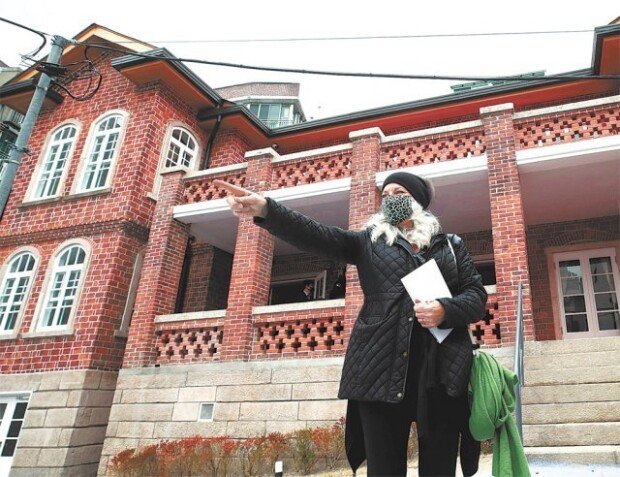Dilkusha house revamped into history museum
Dilkusha house revamped into history museum
Posted February. 26, 2021 07:21,
Updated February. 26, 2021 07:21

“Dilkusha,” the house of Albert Taylor, the first foreign correspondent to break the news on South Korea’s March 1 independence movement, will be opened to the public.
The Seoul Metropolitan Government announced Thursday that the Dilkusha house, which has been revamped into a history museum after restoration, will be opened to citizens on March 1. The house has been abandoned for about 80 years since Taylor was banished by Imperial Japan in 1942.
Dilkusha is a Western-style house which was built in Haengchon-dong, Jongno-gu in 1923 when Taylor was staying in Seoul. It is a two-story red-brick house with a basement. Dilkusha is a Sanskrit word meaning “palace of heart’s delight,” which was given to the house by Mary Taylor, the correspondent’s wife.
Having arrived in Joseon in 1896, Albert Taylor was a businessman who served as a supervisor at Unsan gold mine in Pyongan Province and operated a gold mine in Jiksan, Chungcheong Province, who also provisionally worked as correspondent for Associated Press. He reported the March 1st independence movement and Jeamni massacre, contributing to unveiling Japan’s atrocities to the outside world. Notably, Taylor found a copy of the Declaration of Independence from a bed at Severance Hospital where his wife was giving childbirth, bringing it out to the world.
Dilkusha has been neglected for a long time after Taylor and his wife were banished from the country by a deportation order from the Japanese Government-General of Korea in 1942. Starting 2017, the Seoul government has conducted research to restore the house, and a reconstruction project was launched in 2018 and finished in December last year.
The Seoul Metropolitan Government will hold Dilkusha exhibition’s opening ceremony at 4 p.m. on Friday at the front yard of the house. Jennifer Taylor, the granddaughter of Albert Taylor, will attend the event. The exhibition will be for free, open from 9 a.m. to 6 p.m. from Tuesday to Sunday.
“Once Dilkusha is opened to the public on March 1, it will serve as a valuable venue for historical education,” said Seo Jeong-hyeop, the acting mayor of Seoul. “Displaying the historical records of fighting Imperial Japan, the museum will help remember those who fought for the country’s independence and carry on their spirit.”
Seng-Hyun Kang byhuman@donga.com







